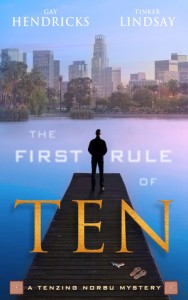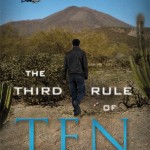Formats available: paperback, ebook, audiobook
Series: Tenzing Norbu #4
Pages: 344
on January 5th 2015
Purchasing Info: Author's Website, Publisher's Website, Amazon, Barnes & Noble, Kobo, Bookshop.org
Goodreads
Ex–Buddhist monk, former LAPD detective, and current private investigator Tenzing “Ten” Norbu knows Bill Bohannon as many things: loving husband, devoted father, police administrator, former partner, and best friend. But then an uninvited guest from Bill’s past upends the Bohannons’ Fourth of July barbecue, revealing in levelheaded Bill the most unexpected behavior—behavior that awkwardly drops Ten in the middle of a crumbling marriage. Ten makes an unexpected move of his own when he agrees to pro bono work for a convicted felon. But it was dope slinger Godfrey Chambers Ten had repeatedly busted during his days on the force, not the reformed and rechristened G-Force who is now asking for Ten’s help in claiming money left to him by a kind-hearted benefactor—and contested by the benefactor’s self-serving family. Soon Ten’s investigations lead him down the darkest corridors of the Internet and halfway around the globe to Sarajevo as he navigates the seedy worlds of human trafficking and personal regret. As his cases intertwine, Ten will rely on the wisdom of the Buddha and his own network of relationships—with super hacker Mike, outrageously idiosyncratic assistant Kim, old monastery friends Yeshe and Lopsang, Serbian cabbie and former policija Petar, and, of course, feline rock Tank—to solve the puzzle and keep free of his own tangled past. Especially when an old flame returns. The Fourth Rule of Ten, the thrilling fourth book in the Dharma Detective series, proves the only thing better than exceeding expectations is having none at all.
My Review:
Ten’s fourth rule is also the title of the theme song from Frozen, “Let it go”. And since the movie came out in 2013 but the book wasn’t released until 2015, there’s a good chance that the authors at least knew about the song when they finished the book.
And I’m going to let that possible coincidence, well, go.
What Ten is trying, but not always succeeding, in letting go of are his expectations. We tend to get ourselves tied up in what we expect to happen, or what we hope will happen, and are upset when life in general or circumstances in particular don’t meet our expectations.
Like when you feel that you’ve had the same conversation with someone so many times that you can anticipate what they are going to say, so you fail to listen to what they actually do say. Life happens. People change. Others were not put on this world to live up to (or down to) our expectations. And vice versa.
Tenzing Norbu is not the usual suspect when it comes to private detectives. Yes, he’s former LAPD, which is fairly normal. But he is also a former Buddhist monk. And his experiences in the monastery have every bit as much to do with the way he approaches and solves cases as does his time in the LAPD. That his father was the abbot of the monastery, and that Tenzing pretty much failed to live up to every single one of his father’s expectations, also has a lot to do with the way Ten lives his life and the way he approaches this particular case.
At the beginning, the expectation that Ten first lets go of is the expectation that this Fourth of July get-together at his former LAPD partner’s house will be just like the previous ones. That his friends Bill and Martha have a solid and loving marriage, and that their twin daughters will shower their “Uncle Ten” with hugs and affection. Well, that last bit does happen, before everything goes to shit.
Bill’s ex-lover shows up in the middle of the family picnic to inform Bill that their son is missing. Bill is gobsmacked, but Martha is shocked beyond belief. Bill never told her about Maia, or that he had a son. Or that he strayed from their exclusive-relationship-but-not-yet-engagement while he was stationed in Bosnia. Her trust is shattered, and their marriage might be too. Especially when Bill leaves with Maia to chase after their missing young man.
Ten, caught in the middle between helping his friend Bill and consoling his friend Martha, at first doesn’t know what to do. Especially when the facts start coming out. Not the facts about Bill and Maia, because that cat is already out of the bag, but the facts about young Sascha and what he is doing that got him in so much hot water.
Sascha is a journalistic in Bosnia, doing his level best to expose at least the local tentacle of the international human trafficking monster. His mother is afraid that his search may have gotten him killed. Bill takes off to see whether he can find the son he’s never met before it’s too late.
That he is also exploring the “road not taken” with his ex makes at least part of this journey look more like a mid-life crisis than a manhunt.
But Ten follows Bill to Bosnia, in an attempt to either talk his friend out of his madness or at the very least help him find Sascha, who really is in danger. And so is everyone he talks to, including Maia, Bill and Ten.
Because that human trafficking monster has its filthy tentacles everywhere, including Ten’s own backyard.
 Escape Rating B+: Tenzing is a detective the opposite of noir. Not that he doesn’t go into dark places, but that he is more self-aware than the average hardened gumshoe. That’s part of what makes him so interesting to follow. And that’s why I keep following, from The First Rule of Ten to the Fourth, and sometime later this year, The Fifth Rule of Ten. While I think it would be possible to start with Fourth Rule if one’s only interest is the mystery, this is a series that rewards reading from the beginning. Who Ten is, why he does things the way he does and how he relates to the world around him is a journey that builds layer upon layer in each book.
Escape Rating B+: Tenzing is a detective the opposite of noir. Not that he doesn’t go into dark places, but that he is more self-aware than the average hardened gumshoe. That’s part of what makes him so interesting to follow. And that’s why I keep following, from The First Rule of Ten to the Fourth, and sometime later this year, The Fifth Rule of Ten. While I think it would be possible to start with Fourth Rule if one’s only interest is the mystery, this is a series that rewards reading from the beginning. Who Ten is, why he does things the way he does and how he relates to the world around him is a journey that builds layer upon layer in each book.
Along with marvelous descriptions of his attitudes toward and his servitude to his feline overlord, the utterly marvelous Tank.
The case that Ten finds himself investigating gets a bit muddled in this one. The scourge of human trafficking in the 21st century is hard to pin down into a single case or a single company, even in fiction. And this case, as horrible as this crime is, surprisingly hinges on the family ties of the perpetrators rather than the victims. Admittedly in a way that slaps the reader with shock at the end.
Most of what’s interesting in this story is Ten’s internal reactions to the events around him, as he examines why he is involved, and what experiences in his past have made him vulnerable to getting roped into Bill and Martha’s mess. It’s fascinating to be inside the mind of someone who is essentially trying to “adult”, as we all do, and seeing his successes as well as his failures.
One of the things that always makes Ten interesting to watch is the way that his past actions get paid forward into his current and future dilemmas. His dysfunctional upbringing gives him empathy for Sascha and makes him vulnerable to Martha’s desperate manipulation. That he treats people fairly and listens attentively makes him friends in unlikely places, and provides him with allies when he needs them the most.
For Ten, what goes around is definitely what comes around. Usually exactly the way he dished it out.
And Ten never gets too far above himself, because Tank is right there to remind him that he’s only human, and that it’s his job to provide dinner.















